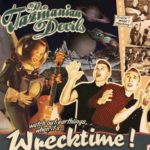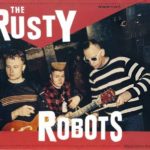The punk-rock component of rockabilly, which is so repugnant to many adherents of rockabilly movements, can be very different. As a rule, we are talking about horror-punk, or something overly cheerful and challenging to get on a skateboard. In the case of The Peacocks, everything is somewhat different.
Hillbilly Moon Explosion‘s compatriots and closest neighbors are The Peacocks, a trio from Stamheim, near Zurich, who do not sing about zombies, vampires, and other evil spirits. There are no political statements here, no tearful tango of broken hearts. And no skateboards! What kind of skates are for a tired hard worker? He should sort himself out and go to the pub.

It’s a pub. The Peacocks‘ music is reminiscent of good old England. This is Guy Ritchie’s England: slightly criminal, not the most prosperous, but very cozy over a couple of pints of beer. The lyrics of the guys are strictly mundane. These are the thoughts that come to mind behind a large wooden counter. And it’s just amazing! Finding billy music, the lyrical part of which does not ride on much–loved but hackneyed stereotypes, is always a good thing.
As for the musical part, the Peacocks are true to themselves on the new record. Their sound is still simple and clear, without unnecessary frills. Drummer Jurg Luder, like almost the entire twenty-first century, plays simple and understandable drawings in the band, which are quite funny, but do not go into metal. His partner in the rhythm section, Simon Langhardt, clicks just as fervently, without going into a slap binge. In general, it is very interesting to watch the rhythmists of this team, since they are officially like libra: Jurg is responsible for punk, and Simon (or is it still Simon?) for rockabilly classics. The master of guitar and microphone, the founder of the band, Hasu Langhart, puts an end to this issue. His sympathies go towards The Clash, and that explains everything. The unpretentious sound of the guitar and the vocals, sincere in their raw directness, finally tip the scales towards exuberant young energy. But let’s not lie, youth is gone. And what now?
First you need to do something about control. It’s best to let go of control, because you really want to! This is one of the most punk songs on the album, with distinctive chants on the backing tracks, an ingraining riff, and some kind of radio interference. This racing song rhymes with the cover, as if hinting that the consequences of rash decisions will overtake anyone who lets go of control.
Nowhere now! Nowhere greets us with a cheerful roll call of Hasu and Simon, going into the classic cantine story of the homeless desperado, which breaks into a bouncing scream in the chorus, where the punk legacy of Jurg is very easy to read.
Some of them start with a crude reference to the whole doo-wop, then go back to the fervent punk in the chorus. I recommend paying attention to the wonderful pauses with the tails of a double bass or drums, as well as a very pleasant solo by Hasu.
City is already frankly punk, and I really want to sing along to the chorus of this song while drinking the very second, or even the third pint. And how softly the double bass lies here! In general, the whole story of the urban tramp will resonate in the heart of almost every listener.
But big cities will always confuse everyone! Twisted begins wearily and in a minor key. This is the most unpleasant feeling when you walk home after drinking and you’re already starting to sober up. There are too many unpleasant thoughts without the ability to deal with them.
However, sometimes it’s worth stopping in time and thinking about what’s what. Stop has a very life-affirming beat and a haunting chorus that contrasts with the main theme. And here, for the first time in the album, mysterious flying keys appear. Well, it’s just wonderful!
The frankly intoxicating It’s Always Only Just One More makes it clear from the first notes what it’s about. We all know what it means to not stop on time. A little hymn to drunken thoughts, introspection and immersion in your tearful memories, lying on the bar counter.
Brand New fully demonstrates all the psychobilly roots, pushing on the minor chorus, banjo, keys and some self-quotes from one and previous releases.
Trouble sounds frankly tired, conveying the feeling of a heavy burden on your shoulders. Discordant backing tracks hint at a sense of alienation, and a small major twist in the chorus gives a shaky hope for the best. This is one of those songs that you need to listen to with your collar turned up on a chilly day.
Do you remember I wrote above that Peacocks don’t have a tearful tango of broken hearts? I lied! Well, only partially. After all, there’s nothing maudlin about Strangers. The theme of parting, which flashed in previous songs, goes through the acceptance stage here. We’ll remain strangers forever, maybe for the best.

And I would like to finish here, but for some mysterious reason there are two more songs on the album. Very strange keys from the eighties start and win in Anti – I find it difficult to understand who the statement is addressed to. In the end, it completely falls apart, wrapping itself in a piece for the same toy piano. Hahaha fits better into the sound of the album, but it’s just superfluous. So who’s laughing now? No one else!
It seems that the two final tracks are a forced and deliberately fucked–up encore, which the musicians did not want to go to.
The Peacocks are like The Beat Devils for adults: less frenzy and more sad reflections. This is very suitable music for a middle-aged urbanite. It doesn’t commit you to anything, because subcultures have remained mostly in your memory, and it doesn’t matter what you prefer: pompadour or mohawk. The main thing is to have a pub nearby.


















It sounds very much in my taste style.,
Very cheerful and life-affirming
And I just appreciate music.:
I want to live under it and get high or suffer.
And this is the first option. In general, the universal desire for life is a real rave.